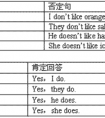按要求改写句子。1.I wear dresses. (改为否定句)_____________________________________________________________2. We always brush our teeth in the morning. (改为-五年级英语
题文
| 按要求改写句子。 |
| 1. I wear dresses. (改为否定句) _____________________________________________________________ 2. We always brush our teeth in the morning. (改为一般疑问句) _____________________________________________________________ 3. Do you have lunch at school? (改为肯定句) _____________________________________________________________ 4. I don't do my homework on Saturday. (改为肯定句) _____________________________________________________________ |
答案
| 1. I don't wear dresses. 2. Do you always brush your teeth in the morning? 3. We have lunch at school. / I have lunch at school. 4. I do my homework on Saturday. |
据专家权威分析,试题“按要求改写句子。1.I wear dresses. (改为否定句)____________..”主要考查你对 肯定句,否定句,一般疑问句 等考点的理解。关于这些考点的“档案”如下:
肯定句否定句一般疑问句
考点名称:肯定句
- 对事物作出肯定判断的句子叫肯定句。
对事物作出否定判断的句子叫否定句。
结构:主语+谓语+其他
例:Tom played football yesterday afternoon. 汤姆昨天下午打篮球了。
This is my bedroom. 这是我的卧室。 - 肯定句分类:
A、使用“是”字句,也叫判断句。
B、使用一般的肯定句式。 肯定句、否定句、一般疑问句和特殊疑问句的相互转换:
1、有am, is, are的句子,
就划线部分提问(变特殊疑问句)
This is a book.
第一步:变一般疑问句 Is this a book?
第二步:找合适的特殊疑问词 Is this what ?
第三步:特殊疑问词提前放到句首,并大写,其余按顺序照抄,省略划线部分。What is this?2、没有am, is, are的句子,
肯定句变否定句:在主语后面加上do not或者does not,其余按顺序照抄动词用原形
肯定句变一般疑问句:在句首加do或者does并大写,其余照抄。注意:动词用原形
肯定句变特殊疑问句(就划线部分提问):分3步骤
第一步:先变一般疑问句
第二步:找合适的特殊疑问词代替划线部分
第三步:特殊疑问词提前放到句首,并大写,其余按顺序照抄,省略划线部分。
注意:一定先变一般疑问句。但是,如果问的是主语或主语的定语时,语序不变,为"特殊疑问词(+主语)+陈述句"。3、划线部分不能在特殊疑问句中出现。
非单三时用do,单三时用does
非单三:
肯定句:I like English.
一般疑问句:Do you like English?
否定句:I do not like English.
单三 :
肯定句:He likes English.
一般疑问句:Does he like English?
否定句:He does not like English.
就划线部分提问:
I like English.
第一步:先变一般疑问句 Do you like English?
第二步:找合适的特殊疑问词代替划线部分Do you like what?
第三步:特殊疑问词提前放到句首,并大写,其余按顺序照抄,省略划线部分。What do you like?4、特殊:
①some变为any。如:
There are some birds in the tree.→There aren't any birds in the tree.
但是,若在表示请邀请、请求的句子中,some可以不变。如:
Would you like some orange juice?
与此相关的一些不定代词如something, somebody等也要进行相应变化。
②and变为or。如:
I have a knife and a ruler.→I don't have a knife or a ruler.
③a lot of (=lots of)变为many或much。如:
They have a lot of friends.(可数名词)→They don't have many friends.
There is lots of orange in the bottle.(不可数名词)
→There isn't much orange in the bottle.
④already变为yet。如:
I have been there already.→I haven't been there yet.- 肯定句的组织结构:
主系表:eg:I'm a girl.
主谓宾:She write a leter to him.
1.主语+系动词(be)+表语
2.主语+call +宾语+宾语补足语
3.主语+name +宾语+宾语补足语
4.主语+is called +宾语补足语
5.主语+is named +宾语
6.主语+regard +宾语+as +宾语被足语
7.主语+be +no (none)+other than (but)+表语
8.主语+be +nothing +else but (but,else than,less than)+表语
9.It is (was)+强调部分+that (who)+从句
10.主语+感觉动词+表语
11.主句+as if (as though)+从句
12.主语+be +said to be (so-called)+表语
13.主语+be,it is said,+表语
14.So far from being +表语,主语+谓语+其它
15.主语+be +more +表语+than +表语
16.主语+be +less +表语+than +表语
17.主语+be +表语+rather than +表语
18.主语+be +not so much +表语+as 表语
19.主语+be +either +表语+or +表语
20.Either +主语+or +主语+be +表语
考点名称:否定句
- 否定句:
表示否定的句子。必须有否定词。
否定句的构成形式:
a. 谓语为be动词时,“be+not "一名学生。
b. 谓语为实义动词而且没有情态动词和助动词时,“do/ does/ did+not"构成否定。
例:I do not like dancing. 我不喜欢跳舞。
He does not want to go to school. 他不想去上学。
c. 谓语为“情态动词+实义动词”时,“情态动词+not”构成否定。
例:You must not smoke. 你千万不要吸烟。
I can not catch it. 我抓不住它。 - 否定句在英语语法中可以分为九类:
(1)一般否定句
I don't know this. No news is good news.
There is no person(smoking)/not a person/not any person(smoking)in the house.
(2)特指否定
He went to his office, not to see him.
I am sorry for not coming on time.
I don't think/believe/suppose/feel/imagine you are right.
(3)部分否定
All the answers are not right
All is not gold that glitters
I don't know all of them.
I can't see everybody/everything.
Both of them are not right.
(4)全体否定
None of my friends smoke.
I can see nothing/nobody.
Neither of them is right.
Nothing can be so simple as this.
(5)延续否定
You didn't see him, neither/nor did I.
You don't know, I don't know either.
He doesn't know English, let alone/to say nothing of/not to speak of(更不用说)French.
(6)半否定句
We seldom/hardly/scarcely/barely hear such fine singing.
I know little English. I saw few people.
(7)双重否定
You can't make something out of nothing.
What's done cannot be undone.
There is no sweet without sweat.
No gain without pains.
I can't help /keep/ laughing whenever I hear it.
No man is so old but(that)he can learn.
- 最新内容
- 相关内容
- 网友推荐
- 图文推荐
| [家长教育] 孩子为什么会和父母感情疏离? (2019-07-14) |
| [教师分享] 给远方姐姐的一封信 (2018-11-07) |
| [教师分享] 伸缩门 (2018-11-07) |
| [教师分享] 回家乡 (2018-11-07) |
| [教师分享] 是风味也是人间 (2018-11-07) |
| [教师分享] 一句格言的启示 (2018-11-07) |
| [教师分享] 无规矩不成方圆 (2018-11-07) |
| [教师分享] 第十届全国教育名家论坛有感(二) (2018-11-07) |
| [教师分享] 贪玩的小狗 (2018-11-07) |
| [教师分享] 未命名文章 (2018-11-07) |


